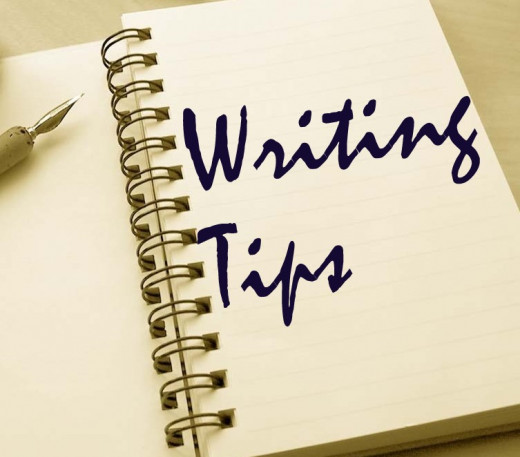Learn How to Strengthen Your Writing Skills
Whether You Have Been Writing for Years, or Are Just Starting Now, Every Writer Can Benefit from Practicing His Craft

List of Tips Every Writer Can Use
Not only do readers love lists, but lists are scientifically proven to attract the eye and improve a reader's understanding of the content. Here is a list of tips and tricks that can apply for all those who enjoy writing, whether they are beginners or experienced writers:
- Brainstorm ideas before beginning to write
- If you are in the midst of a great idea, don't stop to fix the grammar or punctuation, just keep writing and go back and proofread once you have the entire idea on paper
- Ask for someone else to read what you wrote; a fresh set of eyes never hurts
- Everyone writes better in a particular environment or setting; if you are someone who needs silence to write, find a quiet place; if music helps you, carry headphones with you so you can focus on your writing; if you find that you write better outside, then try to get outdoors as much as you can
- Give yourself breaks as you need them; if you push yourself when you are tired or drained, your writing will show it
- Don't rely too heavily on automated spell checkers and grammar checkers; always proofread
- Realize that no one is as critical about your writing as you; ease up on yourself and trust in your abilities
- Be open to the feedback and criticism from others
Writing for Beginners
All writers are beginners at some point, and even those who aren't can benefit from getting back to the basics. Writing may be an art, but there is structural necessities all writers need to master if they want to be successful. If you were to enroll in a Writing 101 class, topics covered would include composition, grammar, syntax, plot development, and sentence structure.
You can have something extremely profound to say, but if you write about it without paying any attention to basic grammar and syntax, your point will get lost in translation.
Advice for beginners that any writer can benefit from:
- Use original detail; being descriptive is what makes a piece engaging and what keeps your audience wanting more.
- Pay attention to syntax, which is the subject/verb/direct object agreement of a sentence. However, also know when it is appropriate to break that rule if it enhances your writing,
- Don't tell writers how to feel - show them through your choice of words.
- Be specific. "The crisp blue ocean"creates a much clearer picture in the mind of the reader than just saying "the ocean."
- Know your audience; are you writing a blog post, an article, a novel? What you are writing affects the way you approach the work.
- Avoid run on sentences and repetiveness in your writing.
- When you finish writing a piece, put it down for a day or two, then go back to it for a proofread.
5 Ways to Improve Your Writing
The More You Write, the Better You'll Get

Tools for Writers
Different Writing Structures
Writing Blogs
When writing a blog, a casual tone is typically used for most posts. Blog posts are often short in length, ranging from 400 to 1200 words per post. Readers came to your site because they were looking for a concise piece covering a certain topic, don't scare away your audience with long blocks of text that go on forever.
To start off a blog post, first introduce your topic. Be succinct and to the point. Follow up your intro with three to five paragraphs covering your topic of choice. Because blog posts are not usually long, they are often less detailed than other types of work. Instead, they include numerous points relating to your topic, concrete facts to back up what you are writing, and breaks in paragraph between new ideas.
Always end your blog post with a short, concise summary that ties together all of the pieces of your argument. Blog posts should ideally end with a call to action.
Writing an Essay
Essays are formal pieces of writing and require attention to detail, structure, grammar, spelling and punctuation. It is always a good idea to brainstorm before starting an essay, so you have all the needed facts in front of you, and you can arrange them in a way that flows well and enhances your argument. Make sure you have a clear focus for the essay - something you are trying to teach your reader, or something you want to convince them to believe.
To begin your essay, start off with a strong thesis statement and an opening paragraph that makes the purpose of the essay clear. In most cases, essays are five paragraphs in length. The first paragraph introduces the topic, the next three paragraphs back up your argument, and the closing paragraph ties the whole essay together.
After writing a strong introduction free of fluff, begin writing the body of your essay. The body should be broken up into one paragraph per point, and each point should be backed up by a scholarly source. Although each paragraph should cover a different point, each paragraph should seemlessly transition into the next paragraph.
Once the body of the essay is finished, wrap up the piece with a closing paragraph that summarizes your supporting facts and restates your thesis.
Writing a Novel
Unlike blog posts and essays, novels are long works that require a unique structure and extensive planning. Novels generally contain three main ingredients. a plot, character development, and a setting. In the introduction of a novel, the plot and setting should become clear to the reader. If you begin a novel with a weak introduction, you will lose your reader before you even get to the heart of your piece.
After a strong introduction that makes the conflict of your piece clear, it is time to build a strong middle for your novel. The middle of a novel provides detail of the progression of events leading up to the climax. It can be easy to become over-wordy here and get lost in your writing. Make sure that the progression of the novel is logical, engaging and descriptive.
Finish up your novel with a strong climax, then make sure that you tie up any loose ends. You don't want readers to get all the way through your novel just to be disappointed by an ending that provides clear resolution for all of your characters.
Dos and Don'ts for Writers
Do's for Writers
| Don'ts for Writers
|
|---|---|
Cover topics that interest you
| Cover topics you aren't familiar with or are uninterested in
|
Start off writing short pieces
| Try to tackle a novel right out of the gate
|
Be open to feedback
| Get offended by criticism
|
Proofread
| Submit a piece without reading it over
|
Break up your content in a logical fashion
| Write large blocks of content that run on and on
|
Write for practice and journal
| Be afraid of sharing your writing with others
|
Keep an open mind
| Get too attached to a piece that could improve from edits
|
Experiment
| Fear stepping out of your box
|
Following this list of do's and don'ts can drastically improve your writing.
Even the Best Authors Benefit from Practicing their Writing

Why SEO is Important for Writing Online
If you are writing content meant to go on the web, there are certain things you need to pay attention. Search engine optimization, meta tags, and keyword usage are essential for any successful online writer or blogger. These three components of a piece will determine whether or not readers will ever be able to find your writing. Your ability to master SEO can determine whether or not you wind up at the top of a search engine's results, or at the bottom.
To make an article SEO friendly, you need to figure out what you are writing about, and what you should use as your article's keywords. Keywords are popular search engine terms that relate to your piece. Ideally, you should find three or four keywords per 400 word post. Try to use each of those keywords twice within the 400 words. Using your keywords too much will ruin the flow of your piece and actually hurt your ranking in search engines.
Backlinking is also key to an SEO friendly article. Authoritative backlinks strengthening your writing and make your readers believe what you are writing. Just lke with your keywords, don't overuse backlinks or it will distract readers and make your piece seem spammy. Two to three links is perfect for a 400-600 word article.
Lastly, be unique. When you incorporate new information, fresh topics, and data that isn't already all over the internet, you will attract more traffic than if you cover something that is already heavily covered.
Proofreading Survey
Admit it - Do you proofread what you write before publishing it?
Why All Writers Need to Proofread
The unconscious mind of the writer produces creative and powerful ideas. It is capable of making unique and original connections. Allowing your unconscious mind to do what it does best is how some of the best pieces of writing come to life.
That does NOT mean that you don't need to proofread what you write. Your unconscious mind doesn't care about things like grammar, punctuation and spelling - it cares about the details, the colors, the smells. Your unconscious is how you create engaging, captivating works, it isn't how you complete well written, captivating works.
You don't want to ruin a great concept because you failed to grammar check afterwords. When you are done with a piece of writing, put it down, then wait a day or so and reread it, checking for any spelling, grammar or syntax issues.









